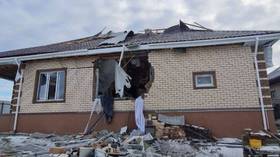Russia to act if Georgia-Ossetia row worsens
Russia will not stand by and do nothing if the situation in South Ossetia escalates into a full scale conflict. That's the view of the Russian Foreign Ministry, responding to an increase in tension between Georgia and it
The Co-chairman of Joint Control Commission for Georgian-Ossetian Conflict Resolution (JCC), Yury Popov, said the key task is “to find ways of preventing what happened on August 1, and on July 4 – when Tskhinvali came under a mortar attack – from happening again”.
He also said diplomatic steps were needed to settle the dispute. According to Popov, “The sides have agreed with our mediation to hold a high-level meeting in Tskhinvali on Thursday, August 7”.
Georgia and South Ossetia have traded accusations claiming their police posts were shelled overnight. There are no reports of any casualties.
According to the president of the unrecognized republic, Eduard Kokoyti, Georgia is acting provocatively to drive Russia out of peace talks aimed at easing tensions between Tbilisi and Tskhinvali.
“It is sad but Georgia, under the instruction of its western partners, is doing all it can to disrupt the current diplomatic talks but also the peacekeeping efforts. Georgian terror groups have infiltrated South Ossetia to spread fear and chaos,” he said.
“This all shows that Saakashvili’s regime has chosen to go down the path of state terror towards its breakaway republics,” Kokoity added.
At a news conference in Moscow, the South Ossetian envoy to Russia, Dmitry Medoyev, said the situation had significantly worsened since last month's visit by U.S. Secretary of State Condoleezza Rice.
“Georgian troops that took part in NATO exercises in the region launched artillery fire on the South Ossetian capital on August 1, killing six people. There is a direct connection between the exercises of NATO troops and the latest attacks on us. And there can’t be two opinions about it,” he said.
Meanwhile, South Ossetia is continuing to evacuate women and children from the area following last week's artillery exchanges with Georgia. Around 3,000 people have left the region over the past three days.
Six people have been killed and 13 injured in recent sniper and mortar exchanges between the two sides.
The region’s government says it is responding to what it sees as an increase in Georgian troops on its border, fearing Tbilisi is planning an armed invasion. Georgia, however, denies the claims and calls the move a ‘political show’.












